Coronavirus world: Europe braces for new restrictions as virus surges
Holland and Norway get set to reintroduce new Covid measures as the coronavirus continues to surge across Europe.
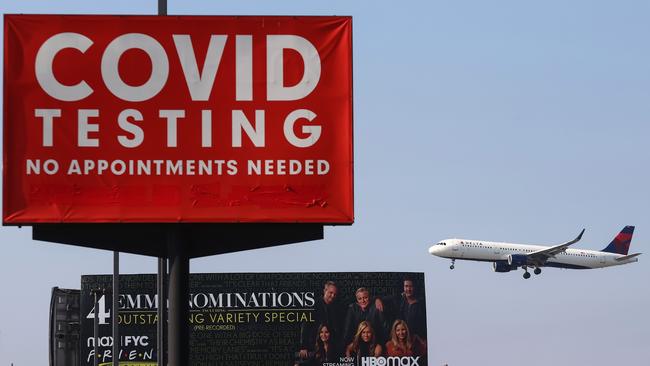
Coronavirus
Don't miss out on the headlines from Coronavirus. Followed categories will be added to My News.
The Netherlands and Norway are set to reintroduce new Covid restrictions as virus cases surge in Europe.
Dutch Prime Minister Mark Rutte announced Western Europe’s first “partial lockdown” of the winter, with three weeks of Covid restrictions on catering, non-essential shops and sport.
The measures come after coronavirus cases in the Netherlands soared above 16,000 a day to hit record levels.
Bars, restaurants, cafes and non-essential shops will have to close at 7:00pm, while people will again be advised to work from home, and people will be limited to having four visitors at home, public broadcaster NOS said.
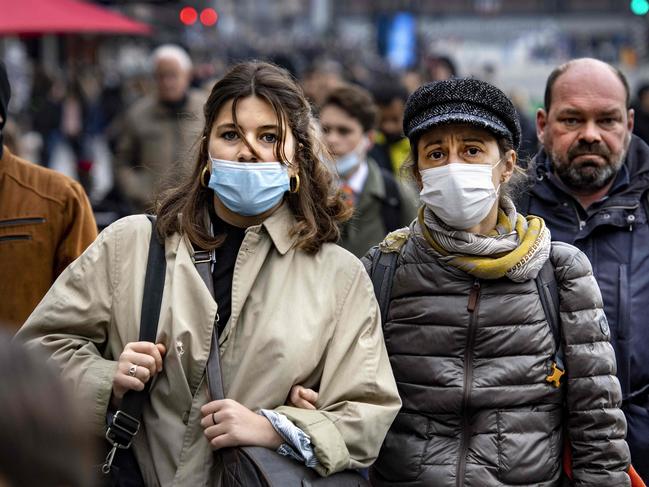
Public events will be scrapped while football matches including the Netherlands’ home World Cup qualifier with Norway next week must be played behind closed doors, they said.
Schools will however reportedly remain open, and people will be allowed to leave their homes without restrictions.
Cases have soared since the Dutch government lifted most Covid measures less than two months ago on September 25, and hospitals have warned that they will soon be unable to cope.
Rutte and Health Minister Hugo de Jonge will hold a press conference to announce the curbs, with broadcaster RTL reporting that the cabinet was describing it as a “partial lockdown” to “quickly reduce cases”.
The government is also reportedly set to limit the “Covid pass” for catering and entertainment after the three-week period, so that it can only be used by people who are vaccinated or have recovered from Covid, and not by people who just have a negative test.
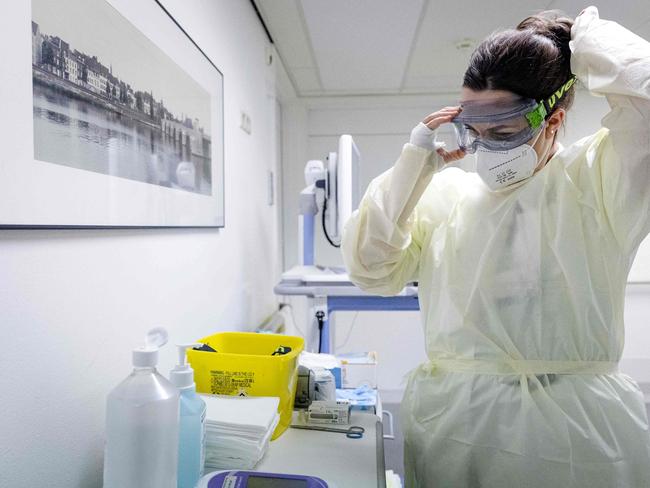
The Netherlands on Friday reported 16,287 cases over the last 24 hours, 44 less than on Thursday when the figure of 16,364 smashed the previous record set in December 2020.
The nation of 17 million people has reported 2.2 million cases and 18,612 deaths since the start of the pandemic las year.
Hospitals have warned they will not be able to make it through the winter under the current conditions.
The Covid spike comes despite the fact that 82 per cent of Dutch people over the age of 12 have been fully vaccinated.
Unvaccinated people account for most intensive care cases (69 percent) and hospital admissions (55 per cent), but waning vaccine efficiency, particularly in the elderly, has also been blamed for the surge.
The Dutch government says it will start giving booster jabs in December. Covid cases are on the march across much of Europe with neighbouring Germany also mulling fresh restrictions.
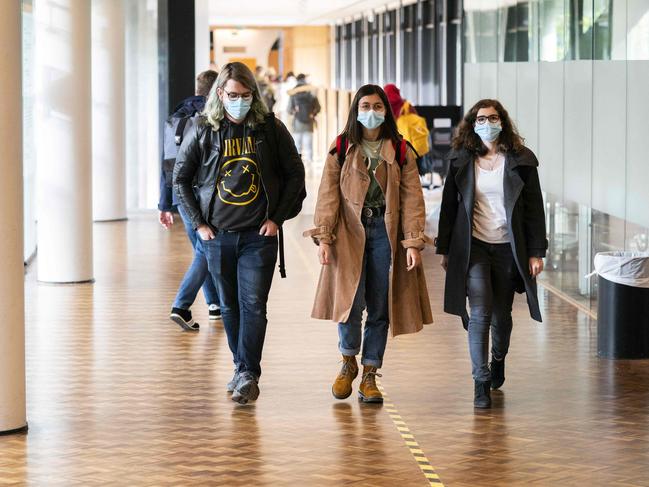
NORWAY REINTRODUCES RESTRICTIONS
It comes as Norway gets set to reintroduce nationwide measures to stem surging coronavirus cases, including authorising towns to use health passes, the government announced on Friday local time.
The Nordic country, which had lifted all Covid-19 restrictions in late September, will also propose a third vaccine dose for people over 18 but will not impose a new lockdown, Prime Minister Jonas Gahr Store told a press conference.
“The government wants to introduce new national measures to contain contagions,” he said.
“However, we are not talking about confinements or measures as strict as we saw earlier in the pandemic.”
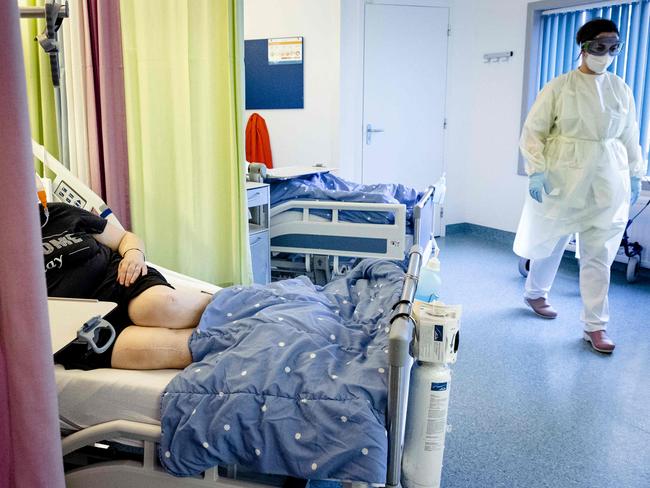
The new measures include a requirement for adults who have been in contact with a positive case to be tested, and unvaccinated health workers will have to be tested twice a week and wear masks.
Local restrictions had reappeared in recent days in Norway, with daily cases at around 1,500 in a country of 5.4 million people.
Europe is facing a sharp deterioration in the epidemic situation, especially in Germany and central and eastern Europe. Non-vaccinated people are the most affected.
The World Health Organization has warned that Europe is once again the “epicentre” of the pandemic.
EU BACKS GROUNBREAKING ANTIBODY TREATMENT
The EU’s drug watchdog has approved two Covid-19 antibody treatments, in its first approvals of the groundbreaking therapies that help stop infected people developing symptoms of the disease.
Ronapreve, made by Swiss pharma giant Roche with US biotech firm Regeneron, and Regkirona, developed by South Korea’s Celltrion, got the green light from the European Medicines Agency (EMA).
The move adds to the European Union’s toolbox of drugs as it fights coronavirus infection rates that are rising to record levels in some countries.
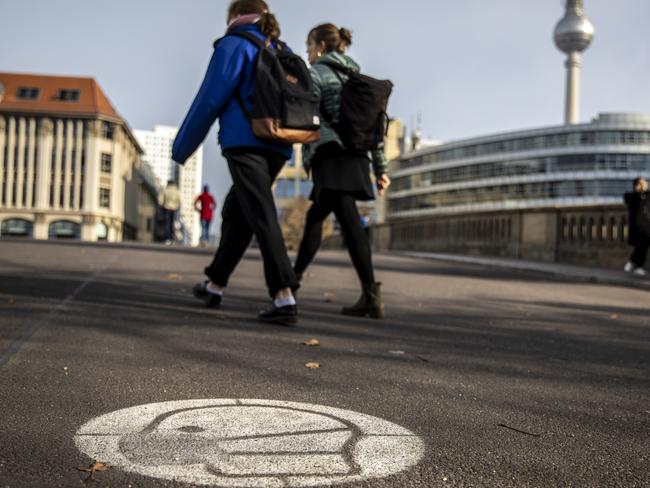
“Ronapreve and Regkirona are the first monoclonal antibody medicines to receive a positive opinion... for Covid-19,” the Amsterdam-based EMA said in a statement.
EU Health Commissioner Stella Kyriakides said the approval of the two drugs was an “important step” against the disease, with the bloc’s response so far relying on four vaccines.
“With Covid-19 infections on the rise in almost all member states, it is reassuring to see many promising treatments in development as part of our Covid-19 therapeutics strategy,” she said in a statement.
“Today we take an important step forward towards our goal of authorising up to five new treatments in the EU by the end of the year.” EU states could already call on the bloc’s contract for 55,000 treatments of Ronapreve, she said.
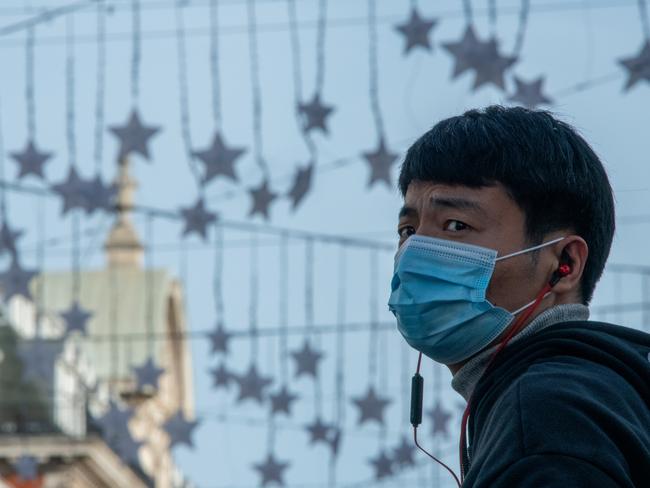
Lab-produced monoclonal antibodies are Y-shaped proteins that bind to the spikes that dot the surface of the coronavirus, stopping the pathogen from invading human cells.
Vaccines train immune systems to produce such antibodies too. But some people including the elderly and immunocompromised do not respond well to vaccines, and such groups stand to benefit the most from “passive vaccination” where the antibodies are delivered directly.
FRANCE IMPLEMENTS COVID PASSPORT CHANGES
Holidaymakers planning a trip to France will face another rule change in regards to travelling when vaccinated.
The country has updated the latest travel restrictions for anyone entering France who is yet to have their booster jabs.
President Emmanuel Macron has announced that anyone who is over 65-years-old must have their third jab by December 15. If they don’t then their vaccine passport - which is required to enter bars, restaurants, cinemas and other public venues - will be invalid.
The only other alternative is to have a negative test, if you are yet to have a booster test, which must be taken every three days.
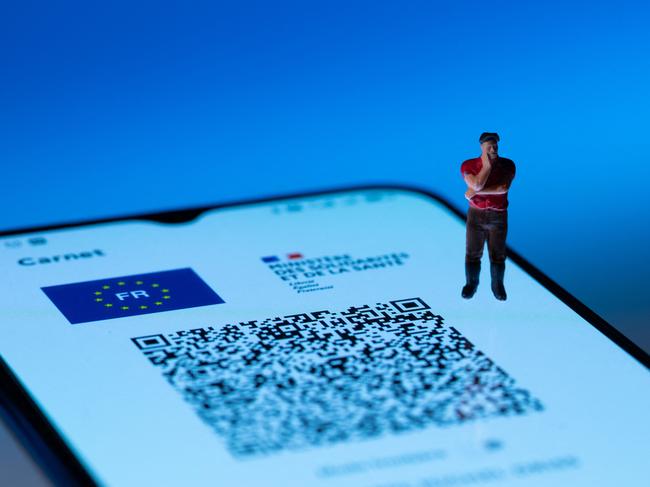
Mr Macron said: “If you have been vaccinated more than six months ago, I encourage you to book an appointment now.”
The pass, called the Pass Sanitaire, is one of the strictest Covid rules for tourists.
France isn’t the only country to introduce restrictions for anything without a booster.
Austria’s government has a 360-day limit on how long they will recognise the effectiveness of a vaccine after the date of the second shot.
Israel has an 180-day limit on how long they will recognise the effectiveness of a vaccine after the date of the second shot.
Both countries extend their full time limit to a third booster jab.
Mr Macron added that from age 50 up, people would be allowed to request an additional vaccine dose, without it being mandatory for the Covid passes of 50-64-year-olds.
France has one of the strictest vaccination regimes in Europe, with the passes required to take intercity trains, visit museums and go to gyms, among other amenities.

That has pushed France’s overall vaccination rate to 75 per cent, a level relatively unchanged in recent weeks.
Doctolib said only 20,000 of the bookings were for first-time vaccinations.
In his speech Mr Macron urged the roughly six million people in France yet to get even a first jab to do so: “This is an appeal for responsibility -- get vaccinated,” he said.
He also said face masks will again be mandatory for all schoolchildren in a bid to avoid a new wave of cases.
The government is also currently weighing making vaccines available to children under 12.
As of Tuesday, there have been an average of 36 daily Covid deaths in hospital over the past week, a 21 per cent rise from the previous week, according to health ministry figures.
France’s total death toll since the start of the pandemic stands at 118,023.
UK ON ‘KNIFE EDGE’ OVER COVID VACCINE MANDATE
Britain’s health secretary’s announcement that all frontline health workers in England must be vaccinated against Covid by April 1 or lose their jobs, has sparked warnings from employers and trade unions that the move will aggravate staff shortages.
“We must avoid preventable harm and protect patients in the NHS, protect colleagues in the NHS and, of course, protect the NHS itself,” Sajid Javid, the health secretary, told parliament, referring to the National Health Service.
He said that about 90 per cent of the service’s workers had received at least two vaccine doses.
This means there are up to 100,000 NHS workers in England who are unvaccinated, raising fears about how the service will cope if they lose their jobs.
“Support for making vaccination a condition for deployment was tempered with concerns that some people may choose to leave their posts if we went ahead with this,” Mr Javid said.
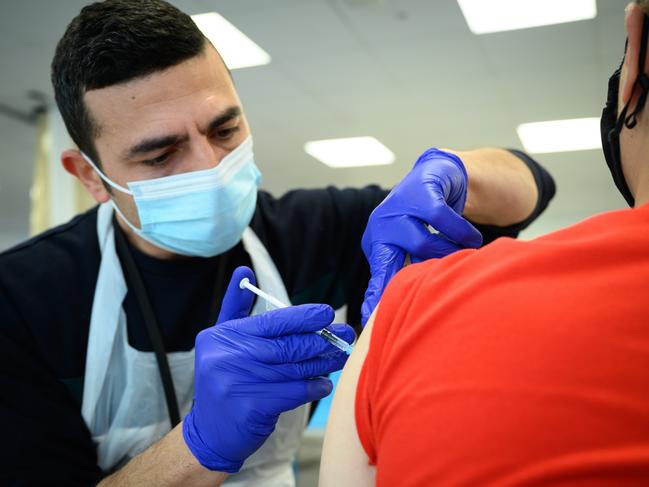
“I have carefully considered the responses and the evidence and I’ve concluded that the scales clearly tip on one side. The weight of the data shows how our vaccinations have kept people safe and they have saved lives and this is especially true for vulnerable people in health and care settings.”
However, many are warning that the move could plunge the health system into crisis at a time when it is already struggling to cope.
“The NHS is under the most intense pressure this winter already, we know the waiting lists are at close to 6 million,” said Labour’s health spokesman Jonathan Ashworth.
“There will be anxiety … that a policy, however laudable in principle, could exacerbate some of these chronic understaffing problems.
“We simply cannot afford to lose thousands of NHS staff overnight,” he added.
Nursing union officer Stuart Tuckwood meanwhile warned that “adopting this compulsory approach could actually demoralise staff, could force them to leave the health service at a time when we’re very, very much struggling with staffing numbers.”
“The NHS is really constantly on a knife edge at the moment in terms of staffing levels,” he said.
“It really doesn’t take much to push the health service into crisis at the moment.”
US KIDS VACCINATED
The United States immunised around 900,000 children aged five-to-11 against Covid in the first week the Pfizer vaccine was authorised for them, a White House official said Wednesday local time.
Roughly 700,000 more have made appointments at pharmacies, White House Covid co-ordinator Jeff Zients said.
“The program is just getting up to full strength,” he said, adding most of the shots were given in the last couple of days alone.
There are approximately 28 million American children in this age group. Vaccinations are taking place at pharmacies, paediatricians’ offices, children’s hospitals, and specially designated sites. In total, some 20,000 sites are planned for children.
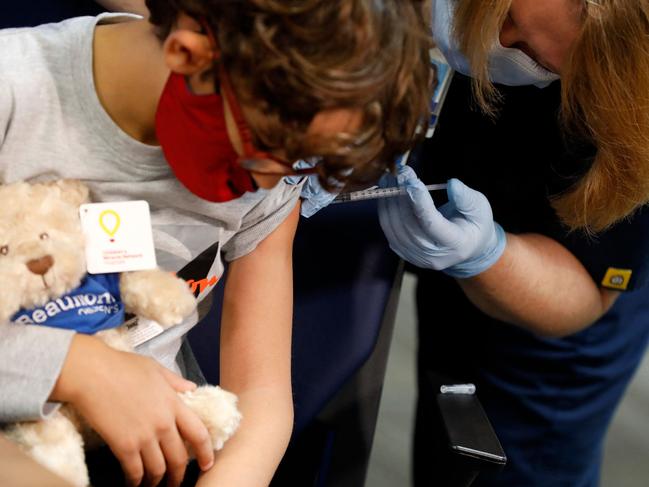
Pfizer was authorised for young children last week. It is administered as two shots three weeks apart, dosed at 10 micrograms, as opposed to 30 micrograms for adults.
“While children remain more resilient than adults to this virus, they still remain at risk,” Rochelle Walensky, director of Centers for Disease Control and Prevention, said.
The US Covid case curve has flattened out to around 73,000 new cases per day, but experts are worried about another surge in infections during winter, especially in colder areas with lower vaccination rates.
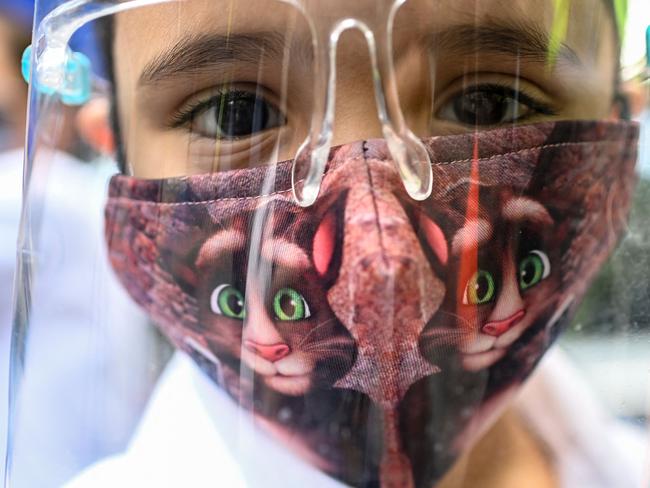
VAX DEVELOPER CALLS FOR MANDATORY JABS
The developer of Russia’s coronavirus vaccine Sputnik V has said Moscow should make jabs mandatory as jab rates remain low despite record deaths and campaigning by authorities.
The plea came as Russia reported a record 1,239 Covid deaths in a single day Wednesday.
Only 34 per cent of the country is fully vaccinated, even though Sputnik V — the world’s first Covid vaccine — has been widely available since December last year.
“Vaccinations should be mandatory,” Alexander Gintsburg, the director of the state-run Gamaleya research centre that developed Sputnik V, said in an interview with government paper Rossiyskaya Gazeta.
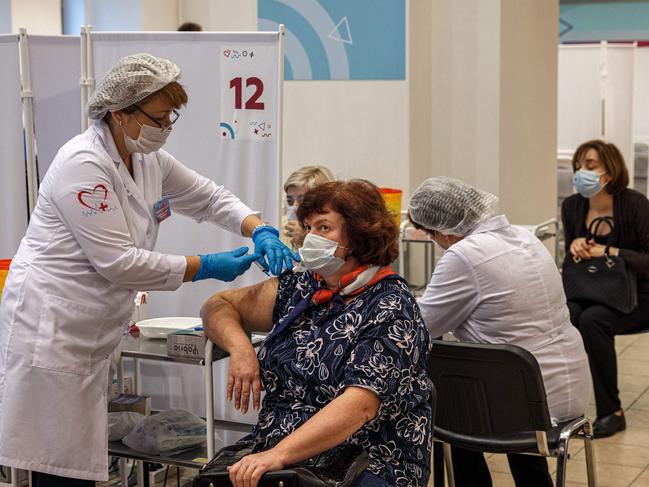
Gintsburg said the pandemic will only come under control in Russia when “70-75 per cent” of the country is fully vaccinated.
“For this, of course, the given vaccine should be included in the national vaccination calendar,” he said.
He also called for children to be taught that they should be vaccinated. “There should be posters that tell people to do this just as you have to wash your hands, brush your teeth, say ‘hello’ and ‘goodbye,’” he was quoted as saying.
Gintsburg said Russia was currently working on developing a nasal vaccine that would “complement” Sputnik V.
He said Moscow was also carrying out tests of a version of the Sputnik vaccine for minors.
Compulsory vaccinations would not “contradict the constitution”, senator Andrei Klishas who chairs a constitutional committee in the upper house of Russia’s parliament, said Wednesday.
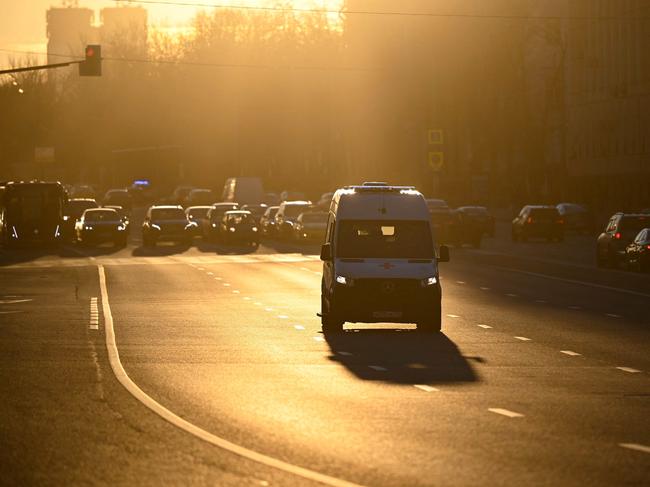
He said that such an initiative would have to be approved by parliament first, according to the RIA Novosti news agency.
Russia’s health minister Mikhail Murashko said doctors who discourage patients from vaccination could face legal consequences, amid widespread reports that medics across the country have taken an anti-vaccine stance.
“In my opinion, it is very inappropriate behaviour” for doctors to be against vaccinations, Murashko said, according to the Interfax news agency.
On Monday, authorities in Russia’s second city Saint Petersburg expanded the list of people subject to compulsory vaccination. It included people over 60, those with chronic diseases and transport employees to its list.
Russia’s statistics agency Rosstat said 44,265 people died in Russia of coronavirus in September — nearly double the official government figure — bringing the agency’s total virus toll to nearly 450,000, the highest in Europe.
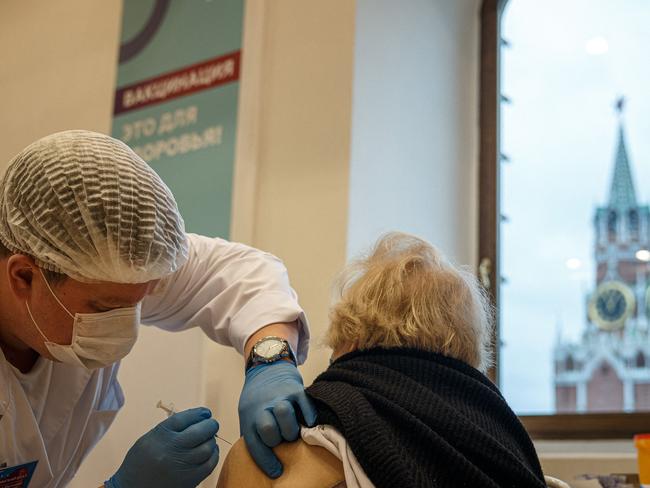
FRANCE’S COVID BOOSTER ULTIMATUM
French President Emmanuel Macron said that those aged 65 and older would need to present proof of a Covid-19 booster shot from mid-December for health passes that give access to restaurants, trains and planes to remain valid.
Macron also said, in a televised address, that the third shot, so far available only for people older than 65 and the vulnerable, will from early December also be available for the 50-64 age group.
“Since the end of summer, a campaign has been launched to protect people over 65 as well as the most fragile among us. Today we must accelerate,” Macron said.
“If you have been vaccinated more than six months ago, I call on you to book an appointment for a booster shot. From December 15, you will need to show proof of a booster shot to extend the validity of your health pass.”
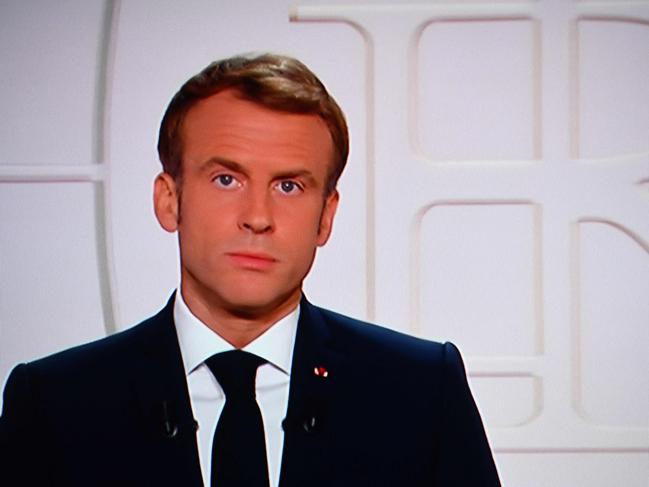
The health pass is required to enter restaurants and bars, to go to the gym or a conference, and for long-distance train and plane journeys.
Macron also urged those not yet vaccinated to do so.
“To those not yet vaccinated: Get vaccinated. Get vaccinated to protect yourselves. Get vaccinated to live normally,” the president said. “We are not done yet with the pandemic.”
Macron said Europe was experiencing a fifth wave of coronavirus infections and that in France there had been an alarming rise in the number of COVID-19 hospital patients and in the spread of cases.
WARNING OVER SYRINGE SHORTAGE
There could be shortfall of up to two billion syringes in 2022, which threatens to hamper vaccine efforts globally if production does not increase, the World Health Organisation has warned.
The shortages are the result of Covid-19 vaccine campaigns, with billions more syringes than normal being used worldwide, badly denting global supplies.
Lisa Hedman, the WHO’s senior Adviser on access to medicines and health products, said as the supply of Covid-19 vaccine doses increased, the supply of syringes needed to keep pace.
“We are raising the real concern that we could have a shortage of immunisation syringes, which would in turn lead to serious problems, such as slowing down immunisation efforts,” she told reporters on Tuesday.
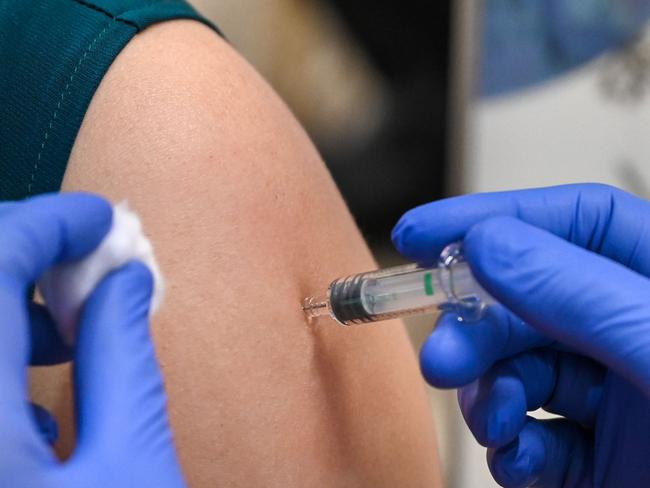
“Depending on how the vaccine uptake goes, it could be a deficit of anywhere from one billion to two billion.”
More than 7.25 billion Covid-19 vaccine doses have been administered globally, according to an AFP tally.
That’s nearly double the number of routine vaccinations given per year – and twice the number of syringes required.
Hedman said one serious result of a shortage could be delays in routine vaccinations, which could have a public health impact “for years to come” if a generation of youngsters missed out on normal childhood vaccinations.
SINGAPORE’S HARDLINE ON UNVACCINATED PEOPLE
Singapore’s government is taking a hard line on those “unvaccinated by choice,’’ ruling it will no longer cover their medical costs if they are struck down by Covid-19.
The country has 85 per cent of those eligible for immunisation fully vaccinated, with 18 per cent having had booster shots, but the unprotected are continuing to put pressure on the health system.
Until now, the government has paid the medical bills of Singaporean citizens, permanent residents and holders of long-term work passes who are sick from Covid-19, unless they tested positive soon after returning from overseas.
On Monday, Singapore’s Ministry of Health adopted a carrot-and-stick approach to vaccination.
It said it would allow up to five fully vaccinated people from the same household to dine-in at food and beverage establishments, promised to “pilot” a return to sport, meetings, conferences and exhibitions for those immunised, resume more activities in schools and further simplify travel protocols “to safely and seamlessly reconnect with the rest of the world”.
But it said the unvaccinated “make up a sizeable majority of those who require intensive inpatient care, and disproportionately contribute to the strain of our healthcare resources”.
The government is now charging coronavirus patients who refuse to be vaccinated and have to attend Covid-19 treatment facilities and hospitals.
“We are taking a stronger stance against those who choose not to be vaccinated,” the ministry said.
Partially vaccinated people will have until the end of the year to finish the process before the new rules apply to them.
The government will continue to cover related medical costs for the vaccinated and those who aren’t eligible for the jabs – which include children aged 12 and under and people with certain medical conditions.
OUTBREAK HAS CHINA UNDER MORE PRESSURE
China’s efforts to eliminate Covid-19 has come under increasing pressure, after the country recorded its most widespread outbreak since Wuhan, despite the country’s extreme “zero-Covid” policies.
Figures released by the National Health Commission on Sunday confirmed 74 new infections for the previous day, of which 50 were locally transmitted — the highest daily count since August.
The current wave of cases has reached the majority of the country’s 31 provinces, in the broadest outbreak since the early days of the Covid-19 pandemic last year.
Most of the local cases were found in Dalian, in the northeastern province of Liaoning, where nine infections were recorded on Wednesday.
The latest outbreak and rise in numbers comes despite the Chinese government enforcing tougher restrictions to curb the spread.
Officials at a press conference in Beijing added that China would continue to adhere to its strict prevention measures, despite other countries in the region abandoning their zero-Covid measures.
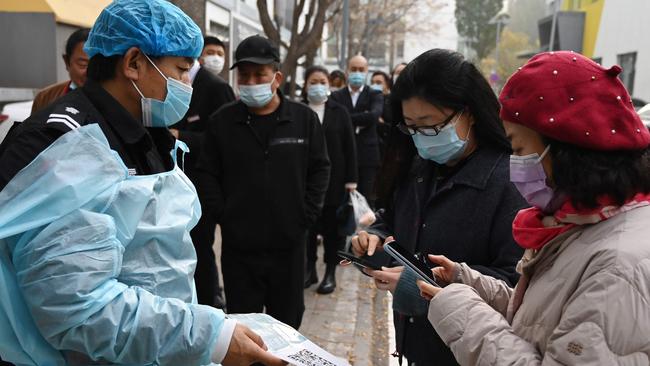
Last week, an expert insisted that the country’s current outbreak would be contained “within a month”.
Zhong Nanshan, a leading expert in China‘s respiratory disease research, told China Global Television Network that China would continue with its zero-transmission policy against Covid, because the global Covid fatality rate of 2 per cent was too high.
“I think the zero-transmission policy will remain in place for a long time,” a leading expert in China‘s respiratory disease research, Zhong Nanshan, told China Global Television Network.
“Exactly how long depends on the global and regional Covid-19 control situations in coming months.”
Last week, residents in China were urged to stock up on daily necessities and for authorities to take steps to ensure adequate food supplies, as the country adopts increasingly tight measures to contain the latest outbreak.
But despite being the epicentre of the pandemic, fewer than 5000 people have died from the virus, according to official Chinese figures.
And more than 2.3 billion vaccine doses have been administered — by far the highest in the world.
US OPEN FOR BUSINESS AS VAXXED TRAVELLERS FLOCK IN
Long lines formed at border crossings on Monday local time as the US reopened to foreign visitors fully vaccinated against Covid-19 – including Australians – ending 20 months of restrictions that separated families, hobbled tourism and strained diplomatic ties.
From Rainbow Bridge at the US-Canada border to Mexico’s Tijuana crossing at San Ysidro, California, cars, motor homes and masked pedestrians clogged entry points before dawn as they sought eagerly anticipated reunions with family members and friends.
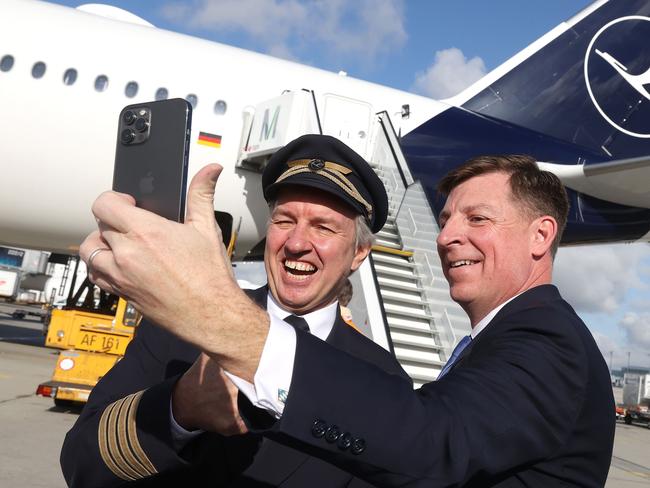
At airports in Europe, passengers queued excitedly to board planes bound for American cities, while those entering the country by land — some seen lugging suitcases and pushing bag-filled strollers under the watchful eyes of border patrol agents — were greeted by hours-long wait times.
The ban, imposed by then president Donald Trump in early 2020 and upheld by his successor Joe Biden, had become emblematic of the upheavals caused by the pandemic.
Trump initially closed US borders to China travellers in February, 2020. A month later he extended the ban to large swathes of the world, including the European Union, Britain, India and Brazil, in an effort to slow the spread of the coronavirus.
Overland visitors from Mexico and Canada were also banned.
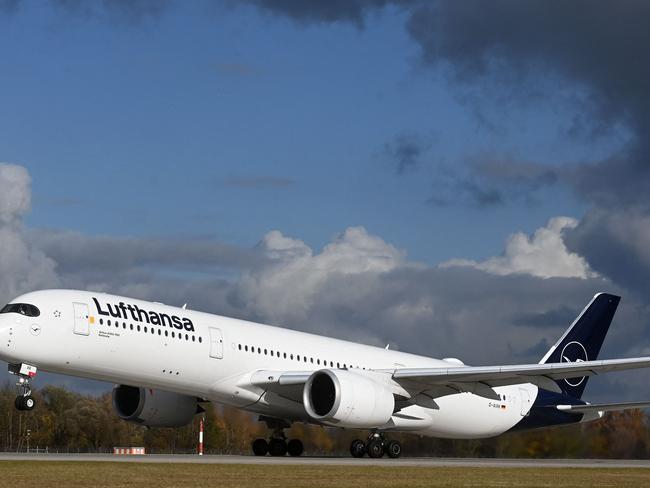
LARGER PLANES
At Frankfurt airport in Germany, Hans Wolf was visibly moved as he queued at the check-in counter, bound for Houston to visit his son whom he has not seen in two years.
“We booked the first flights in March and had since then rebooked I think 28 times, and spent so much money in between that this flight must really be profitable now,” he said.
In a historic move, two planes from rivals British Airways and Virgin Atlantic heading to New York took off at the same time from London’s Heathrow Airport on parallel runways to mark the occasion.
To cope with surging demand, airlines have increased the number of transatlantic flights and plan to use larger planes.
Along the US-Mexico border, many cities have faced economic struggles due to anti-Covid trade restrictions.
Reflecting widespread anticipation of the reopening, currency exchange centres in Mexico’s Ciudad Juarez were hit by a shortage of dollars.
The Ciudad Juarez government has implemented a special system to direct traffic, with portable toilets on the three bridges crossing into the United States “as waiting times of up to four hours are estimated,” said the local director of road safety, Cesar Alberto Tapia.
In the United States’ northern neighbour, seniors will be able to resume their annual trips to Florida to escape the bitter Canadian winters.
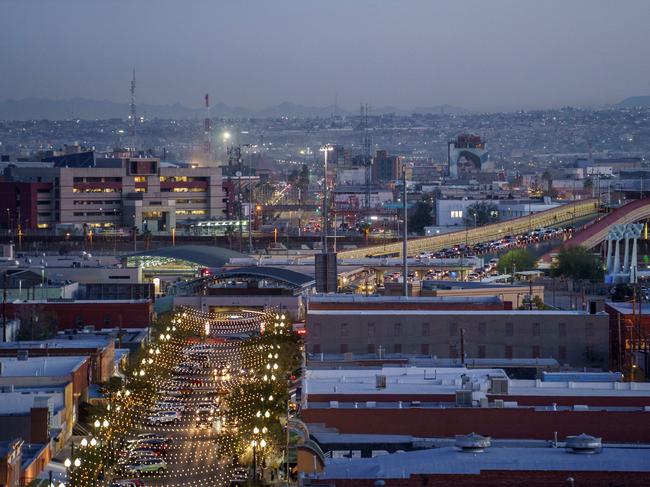
Before sunrise, passenger cars and motor homes lined up on Rainbow Bridge straddling the border at Niagara Falls.
But the cost of PCR tests that Canada requires for cross-border travel — up to $250 — can be prohibitive.
Ann Patchett, an Ontario resident, told the Ottawa Citizen it will cost $500 for her and her husband to go south to visit family.
“Do you want to hug your children? Do you want to tuck your grandchildren into bed?” she asked. “It’s very frustrating.”
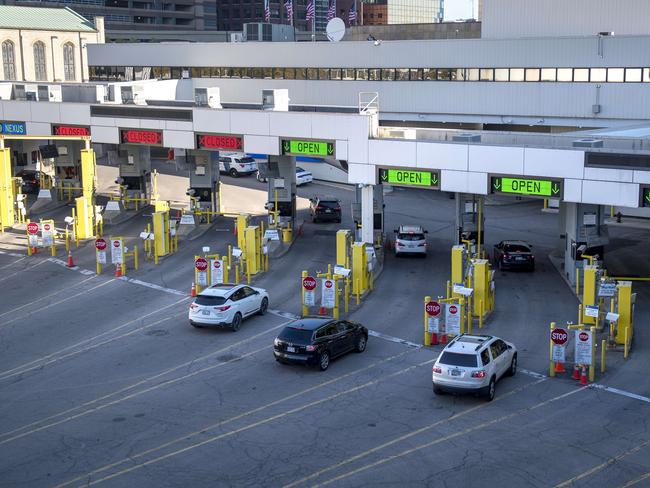
SOME RESTRICTIONS REMAIN
Lifting the travel ban will affect more than 30 countries, but entry into the US will not be unregulated.
US authorities plan to closely monitor travellers’ vaccination status and will still require them to present negative Covid tests.
The reopening will happen in two phases.
Starting Monday local time, vaccines will be required for “non-essential” trips — such as family visits or tourism — although unvaccinated travellers will still be allowed into the country for “essential” trips.
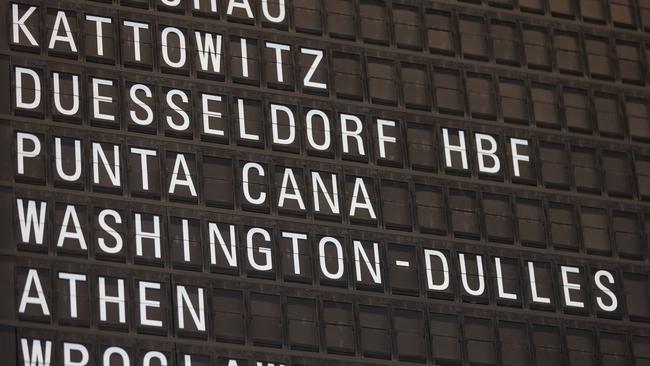
A second phase, beginning in early January, will require all visitors to be fully vaccinated to enter the US by land, no matter the reason for their trip.
US health authorities have said all vaccines approved by the US Food and Drug Administration and the World Health Organisation would be accepted for entry by air.
At the moment, this includes the AstraZeneca, Johnson & Johnson, Moderna, Pfizer/BioNTech, Covaxin, Sinopharm and Sinovac vaccines.
Many US politicians, including House Republican Elise Stefanik whose New York district borders Canada, expressed a sense of relief at the US reopening.
“Finally, the day we have been waiting for,” she said in a video statement. “We have worked hard on a bipartisan basis, and while this is far too late, November 8th is here and we want to make sure that this border reopening is as smooth as possible.”
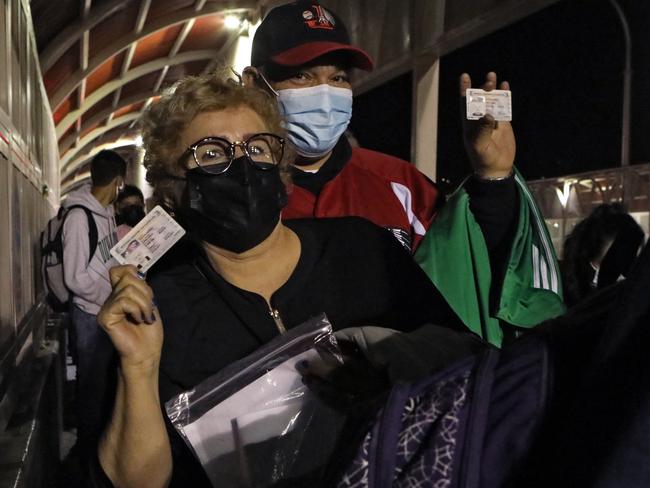
EUROPEAN COUNTRIES BATTLE SURGES
Meanwhile, the World Health Organisation has expressed “grave concern” over the rising pace of coronavirus infections in Europe, warning that according to “one reliable projection” the current trajectory would mean “another half a million Covid-19 deaths” by February.
It comes as coronavirus surges again in Europe, which was the first epicentre of the pandemic, as the continent recorded 1,418,032 deaths from 75,631,991 infections on Friday.
Europe experienced a 7 per cent spike in the number of new recorded daily cases over the week but the situation has been worsening on the continent for nearly two months.
The countries which suffered the largest spikes over the week were Austria (cases increased by 66 per cent), the Czech Republic (56 per cent), Greece (54 per cent) and Poland (45 per cent).
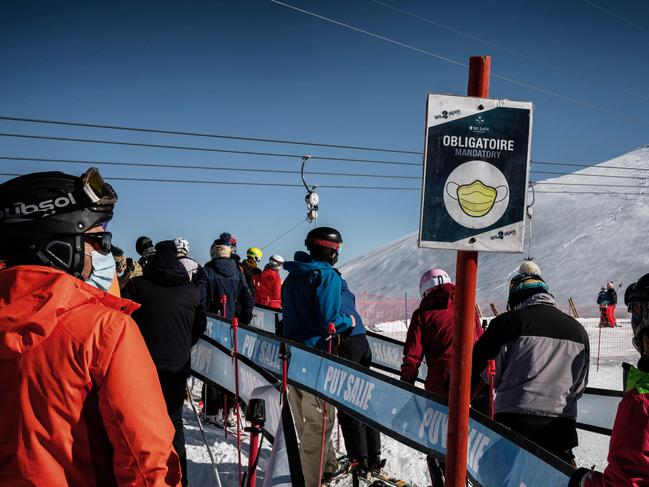
Countries such as Austria and Iceland, which had earlier appeared to be relatively unscathed, are now tightening coronavirus restrictions to try to stamp down the rising infection rate.
Austria on Friday said only those vaccinated or cured from coronavirus would be allowed to frequent restaurants, hotels and cultural venues as the Alpine nation battles a surge in cases.
The new rule takes effect on Monday with a four-week transition phase to incentivise people to get jabbed, Chancellor Alexander Schallenberg said.
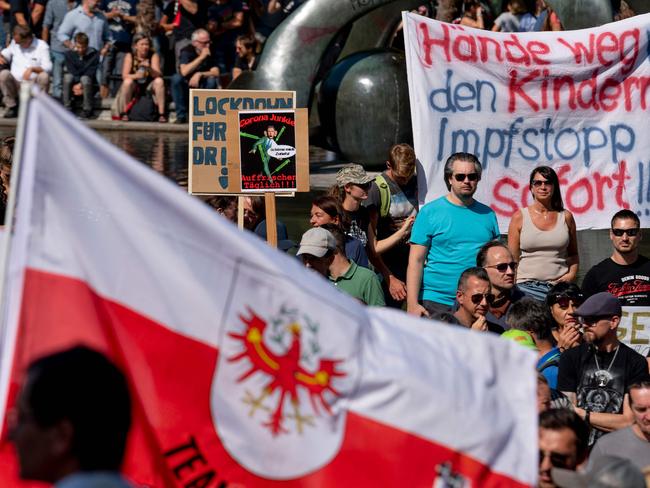
“No one wants to split the society, but it is our responsibility to protect the people in our country,” he told a news conference.
The EU member of almost nine million people recorded more than 9300 new daily cases on Friday, a fresh record for this year.
Besides considering hospitals’ ICU units filling up faster than expected, tourism-dependent Austria also fears being backlisted by other countries because of the rapid virus spread.
Around 64 per cent of the population is fully vaccinated, which is below the EU-wide average of some 67 per cent.
Under the new rules, a negative Covid test will also no longer be sufficient for services with close contact such as at the hairdressers, and only those vaccinated and cured can attend gatherings of 25 people or more.
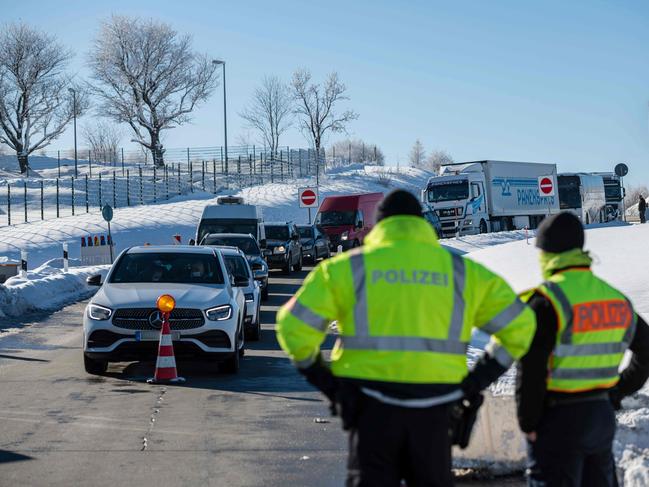
Iceland also said it would tighten its Covid rules as it battles a rise in new cases, including capping gatherings and mandating masks in crowded areas.
The new measures were announced after the World Health Organisation said that Europe was facing an alarming surge in cases, warning another 500,000 could die by February.
Iceland has recorded 179 new infections in the past 24 hours, a record since the start of the pandemic, according to health authorities.
“It’s uncomfortable to see how steep the curve is and the increase is greater than what we’ve seen before,” health Minister Svandis Svavarsdottir told reporters following a ministerial meeting.
The government said one-metre social distancing should be maintained in all public spaces, and if that was not possible, masks must be worn.
The limit on the number of people allowed at public gatherings will be lowered to 500 people as bars and clubs will also have to close their doors at 11pm, two hours earlier than what is now allowed.
The restrictions will remain in place for at least four weeks.
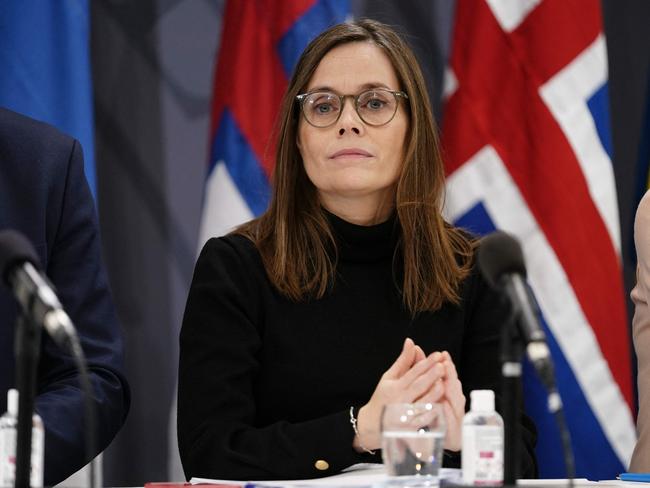
“The daily number of infections must be reduced to 40-50 and this situation must be maintained with restrictions until a better collective immunity is reached thanks to vaccine boosters and natural infections,” the Ministry of Health explained in a statement.
While 89 per cent of the population aged over 12 is fully vaccinated in the Nordic country, the country’s chief epidemiologist on Friday called for a third dose for all people over 16 who have been fully vaccinated “for about six months”.
“The usefulness of a booster dose to strengthen the immunity of each individual and society as a whole has now become very clear,” Thorolfur Gudnason said.
Iceland, with a population of 375,000, has had a total of 14,255 cases of Covid-19 since the start of the pandemic and 34 deaths.
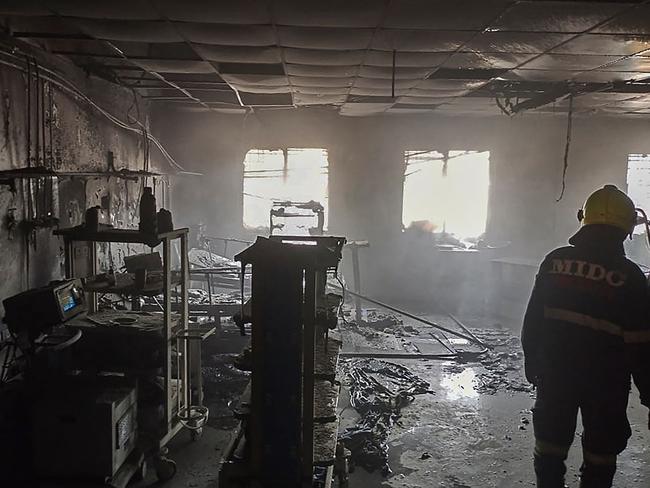
INDIA CORONAVIRUS HOSPITAL FIRE KILLS 11
Fire tore through a hospital in western India on Saturday killing at least 11 coronavirus patients, officials said.
The blaze was the latest to hit pandemic wards across India. There were about two dozen patients at the intensive care unit in the hospital in Ahmadnagar district, Maharashtra state, when the fire broke out, officials said. Most of the dead were aged over 60.
The hospital ward, which was left a charred wreck, had been newly built for coronavirus patients.
Maharashtra state chief minister Udhav Thackeray ordered a formal investigation into the blaze and safety conditions at the hospital 250km from the regional capital Mumbai.
India’s underfunded public health system was pushed to breaking point by a coronavirus surge in April-May. But a number of Covid-19 hospitals were hit by fire tragedies.
At least 16 Covid-19 patients and two nurses were killed in a blaze at a hospital in Gujarat state in May. A police investigation blamed a short-circuit in the hospital’s ICU.
In April, at least 13 Covid-19 patients were killed at a Mumbai clinic, which came just days after another hospital blaze in the city that left 22 dead.
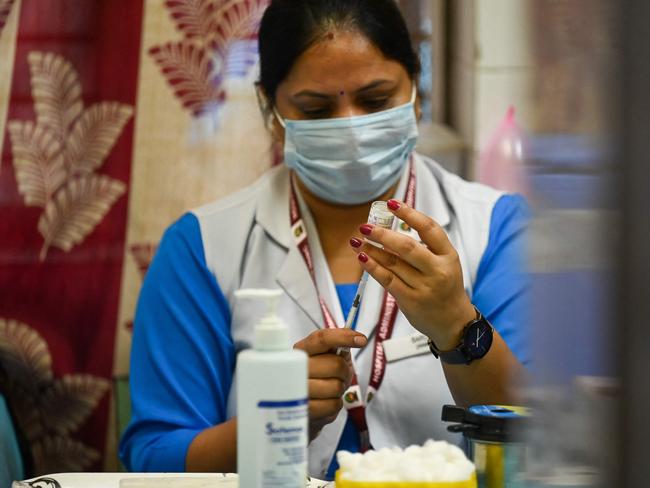
NEW JAB APPROVAL REQUESTED IN US AGES 2-18
US company Ocugen announced Friday that it had asked authorities for emergency use authorisation for Covid-19 vaccine Covaxin, which was developed in India, for ages 2 to 18.
Ocugen’s data, gathered from clinical trials conducted outside of the United States with only a small group of children, may not be enough for the Food and Drug Administration (FDA) to grant the request.
Covaxin, developed in India by Ocugen’s partner, Bharat Biotech, gained emergency approval from the World Health Organisation on Wednesday and has already been cleared for use in 17 countries.
Tens of millions of doses have been administered to adults outside of the US, notably in India.
The immunisation uses inactivated virus technology, common in other childhood vaccines including polio shots.
The approval request is based on results from a study of 526 kids between ages 2 and 18 who received two doses of Covaxin 28 days apart.
The findings were compared with those from a group of 25,800 adults in India, which suggested “similar protection in children, ages 2-18, to that demonstrated in adults older than 18 years,” the company said.
Ocugen co-founder Shankar Musunuri in a press release called the move “a significant step toward our hope to make our vaccine candidate available here.” In the clinical trial with 526 children, no serious adverse events or hospitalisation were observed, but the study’s sample size may not have been large enough to detect rare side effects.
The FDA asked Pfizer and Moderna, whose Covid-19 vaccines have already been authorised in the United States, to conduct trials with thousands of children to have a better insight into any side effects.
Pfizer’s shot is the only one approved in the US for children under the age of 18, and health authorities cleared the way this week for 5 to 11-year-olds to receive the vaccine.
PFIZER PILL A STEP TOWARDS ENDING THE PANDEMIC
Pfizer has announced that a clinical trial of its pill to treat Covid-19 has shown it is highly effective, hailing it is as a big step towards ending the pandemic.
A simple pill to treat the coronavirus at home has been sought since the start of the global health crisis. So far all treatments have been either intravenous or vaccine shots.
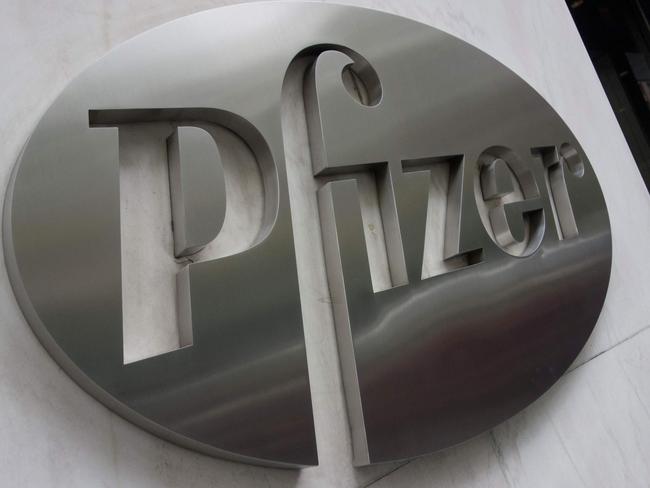
Pfizer’s is the second anti-Covid pill after that of Merck, which is actually an influenza medicine rebranded to fight the coronavirus. Pfizer’s has been created specifically to fight Covid.
The Pfizer drug called Paxlovid achieved an 89 per cent reduction in risk of hospitalisation or death among adult patients with Covid who are at high risk of progressing to severe illness, the US company said.
The results from the middle-to-late stage clinical trial were so strong that Pfizer will stop recruiting new people for the trial, it said.
Pfizer will submit the data to the US Food and Drug Administration as soon as possible as part of its “rolling submission” for Emergency Use Authorisation.
“Today’s news is a real game-changer in the global efforts to halt the devastation of this pandemic,” said Pfizer CEO Albert Bourla.
“These data suggest that our oral antiviral candidate, if approved or authorised by regulatory authorities, has the potential to save patients’ lives, reduce the severity of Covid-19 infections, and eliminate up to nine out of 10 hospitalisation,” he added.
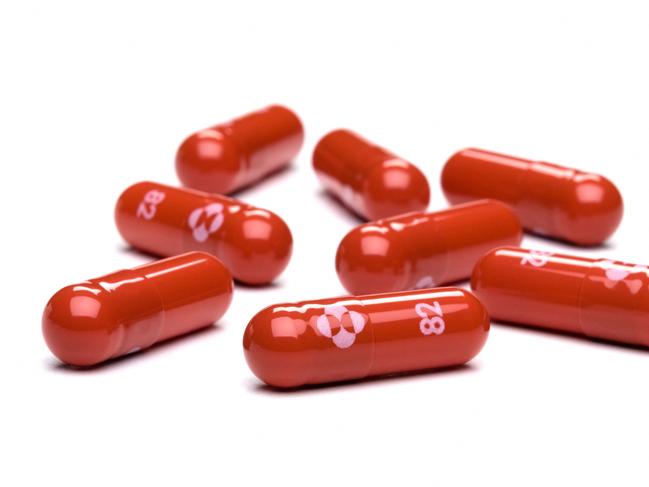
The main analysis of the data looked at numbers from 1219 adults in North and South America, Europe, Africa and Asia.
In the days immediately after symptoms appeared, some of them were given the experimental drug and others got a placebo — for five days, every 12 hours.
“The scheduled interim analysis showed an 89 per cent reduction in risk of Covid-19-related hospitalisation or death from any cause compared to placebo in patients treated within three days of symptom onset,” Pfizer said.
Ten people who took the placebo died, while among those who got the Pfizer medication, none did.
Pfizer had planned a testing pool of 3000 people but stopped when it got to 70 per cent of that because the results of the medication were so promising.
THE SEARCH FOR A PILL
Several companies are working on so-called oral antivirals, which would mimic what the drug Tamiflu does for influenza and prevent the disease from progressing to severe.
Britain on Thursday became the first country to approve an anti-Covid pill, as it greenlit the use of Merck’s antiviral drug called molnupiravir to treat patients suffering from mild to moderate coronavirus.
Pfizer’s product is known as a “protease inhibitor” and has been shown in lab testing to jam up the virus’ replication machinery.
If it works in real life, it will likely only be effective at the early stages of infection.
By the time Covid progresses to severe disease, the virus has largely stopped replicating and patients suffer from an overactive immune response.
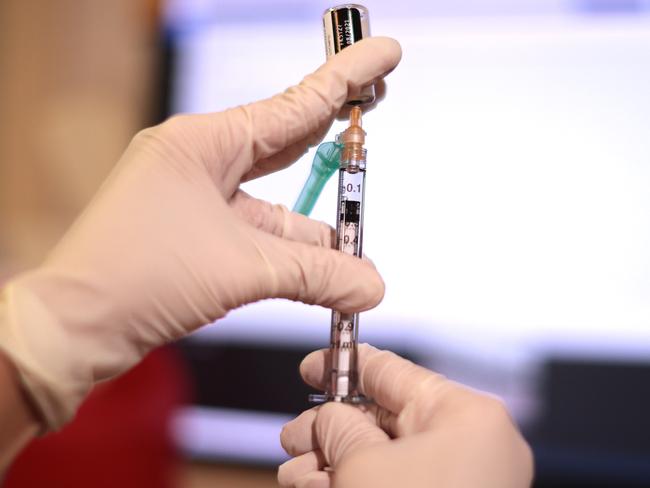
Until now, Covid therapeutics such as monoclonal antibodies and Gilead’s remdesivir — authorised for use in the EU under the name Veklury — have been administered intravenously.
Merck’s molnupiravir was initially developed as an inhibitor of influenza and respiratory syncytial virus — two other important acute respiratory infections — by a team at Emory University in Atlanta, Georgia.
Britain, which has been one of the countries hardest hit by the pandemic, announced on October 20 that it had ordered 480,000 doses of molnupiravir.
Pfizer is carrying out two other clinical trials with its pill: among people who are not at risk of progressing to severe Covid, and among people close to someone with Covid to see if it protects them against the illness.
Besides Pfizer and Merck, the Swiss pharma giant Roche is also working on a Covid pill.
UK FIRST TO APPROVE Covid PILL
Earlier this week, Britain became the first country to approve an antiviral pill to treat Covid-19. Approval for Merck’s antiviral drug allows a new treatment for patients suffering from mild to moderate coronavirus, regulators said.
The antiviral, called molnupiravir, works by decreasing the ability of a virus to replicate, thereby slowing down the disease.
Based on the clinical trial data, the drug is most effective when taken during the early stages of infection and the MHRA recommends that it be used within five days of the onset of symptoms.
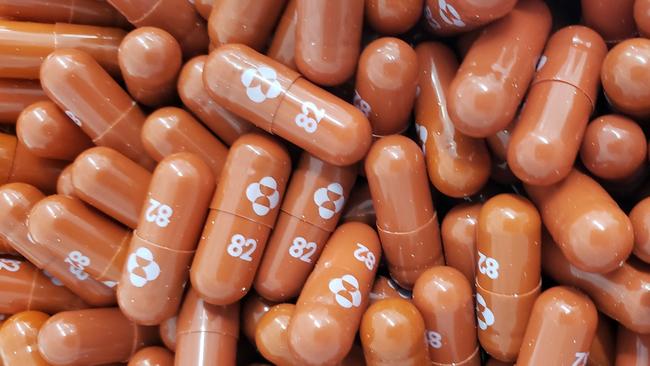
It has been authorised for use in people who have at least one risk factor for developing severe illness, including obesity, old age, diabetes and heart disease.
Britain, which has been one of the countries hardest hit by the pandemic, announced on October 20 that it had ordered 480,000 doses of molnupiravir from US pharma giant Merck.
Drug regulators in the US and the EU have already begun an evaluation of the drug.
The Medicines and Healthcare products Regulatory Agency (MHRA) said its trials had concluded it was “safe and effective at reducing the risk of hospitalisation and death in people with mild to moderate Covid-19 who are at increased risk of developing severe disease”.
“This will be a game-changer for the most vulnerable and the immunosuppressed, who will soon be able to receive the groundbreaking treatment,” said health Minister Sajid Javid.
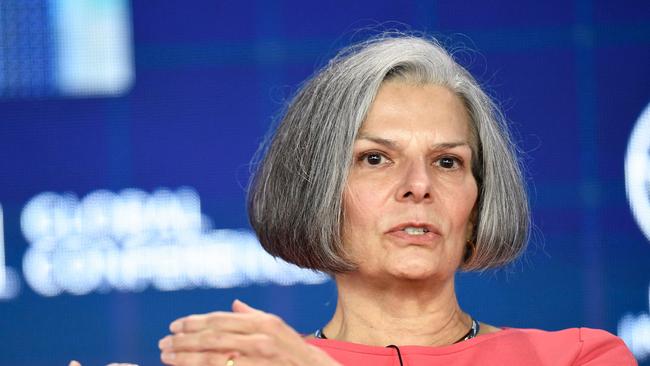
Merck has already signed agreements with other governments, including the US, which has planned to buy 1.7 million doses if molnupiravir if approved by regulators.
MHRA chief executive June Raine called the pill important because it means it can be administered “outside of a hospital setting.”
Clinical trials found the drug to be effective in reducing the risk of hospital admission or death for at-risk non-hospitalised adults by 50 per cent, according to Munir Pirmohamed, chair of the Commission on Human Medicines.
But experts have warned that the treatment is not a miracle cure and Pirmohamed said it was not intended to be used as a substitute for vaccination against the virus.
Originally published as Coronavirus world: Europe braces for new restrictions as virus surges




